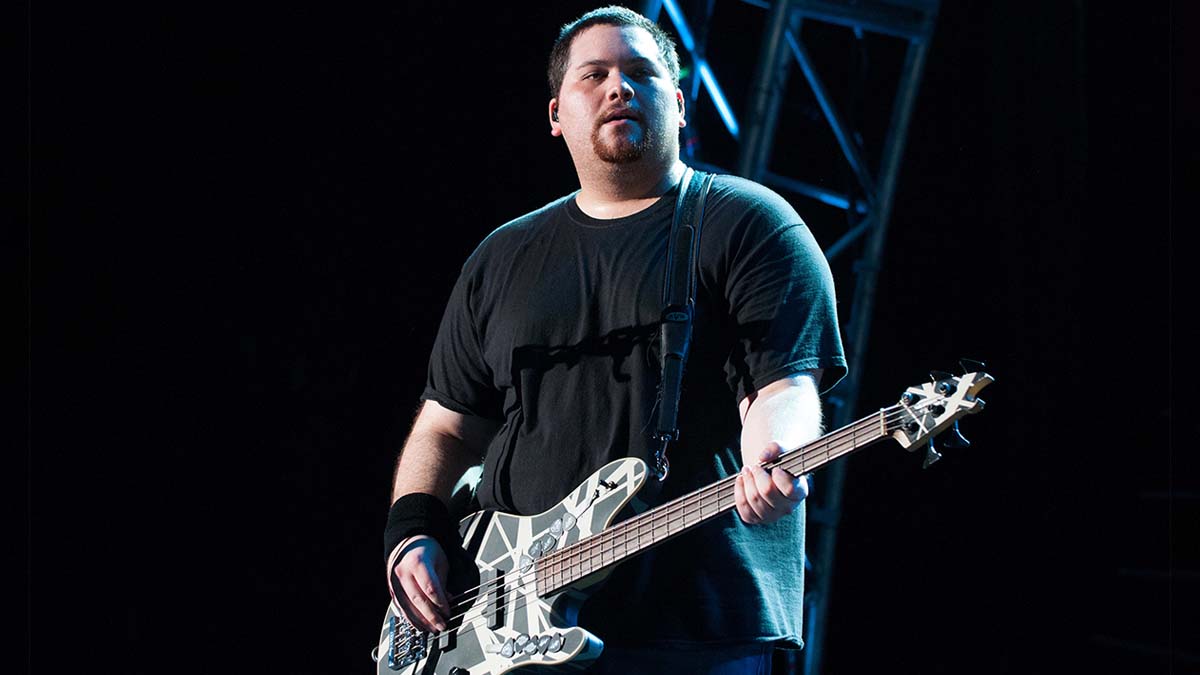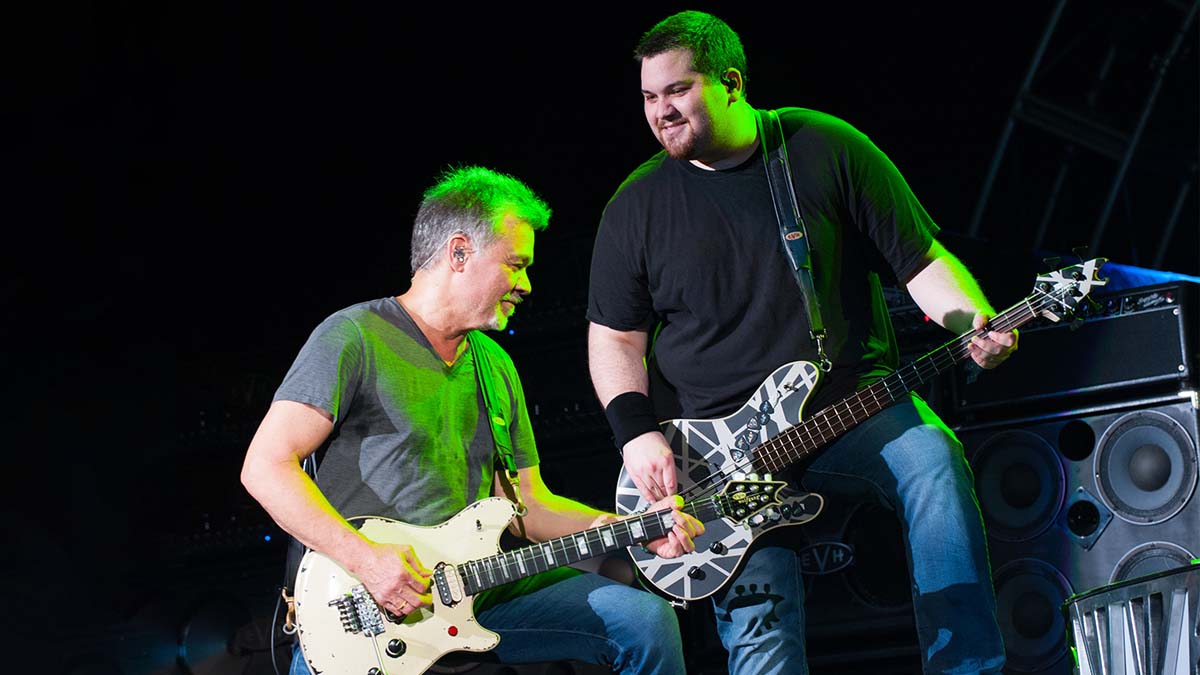Wolfgang Van Halen on his bass journey
It's not about the solos or the virtuoso playing, says Van Halen – it's all about the songwriting

The story of Wolfgang Van Halen is not like that of most bass players. For starters, his father Eddie Van Halen is one of the most acclaimed guitar players in history, having pioneered a spectacular new approach to his instrument in a band whose rock ’n’ roll exploits were legendary.
Born in 1991, Wolfgang first picked up the guitar and then the bass in his mid-teens, and joined Van Halen a few years later when the group – also featuring his uncle Alex Van Halen on drums, and singer Dave Lee Roth – had split from their long-time bassist Michael Anthony.
In 2012 Wolfgang appeared on Van Halen’s final album, A Different Kind Of Truth, and went on to play with Alter Bridge guitarist Mark Tremonti and Sevendust’s Clint Lowery.
All this has led to his new solo album, released as Mammoth WVH: The band name comes from Eddie’s early band Mammoth, and on the record Wolfgang plays every instrument and sings.
Produced by Michael ‘Elvis’ Baskette, the record is a sensitive collection of anthemic songs with little of the extravagant soloing for which his dad, who sadly passed away last year, was justifiably famous. We asked VH Jr how it came about.
Did you get the album recorded before the pandemic, Wolfgang?
“Yeah, quite a bit before – I did it between 2015 and 2018. I started writing around 2013, with the intention of recording something on my own. I didn’t know exactly what I was doing at the beginning, I just knew I wanted to record some music that I wrote.
Get The Pick Newsletter
All the latest guitar news, interviews, lessons, reviews, deals and more, direct to your inbox!
“Through the process, I found out that what I enjoy most is writing songs. I think, most people, if they pick this album up with any preconceived notion of who I am or where I’ve come from, are probably going to expect a lot of guitar solos and shredding on it. What they’ll eventually find out – if they don’t immediately throw it away, after not hearing what they want to hear – is that I’m a songwriter first.“
What are the upsides of playing all the instruments yourself?
“I think the benefit of doing everything yourself is that when you’re just one part of an album – like if you’re just the guitar player, or just the bass player – you tend to want to show off, so you can be like, ‘That part is me!’ But when you’re playing everything, if you showed off on every instrument, it would just be a jumbled mess. So it becomes about creating cohesive songs and doing everything best for the song.“
Did you work closely with your producer?
“Yeah, Elvis Baskette is wonderful to work with. He really helped me when I was doubting myself, and he’s phenomenal when it comes to mixing. When you’re doing everything yourself, you kind of get lost in the sauce. It really helped to have him there to keep me from doubting myself and to keep me going on the right path.“
The one thing I didn’t want to do was carry over my bass sound from Van Halen, so we landed on that StingRay and it sounded really great
Did he have ideas about song arrangements, too?
“Nothing too much – just like, ‘This would work better if we did this there’ or ‘What if we cut that part?’ Just restructuring certain things. It was wonderful to figure out the process, because it was my first time doing anything like that. I’d recorded albums before, but this was a very new experience.“
What bass gear did you use on the record?
“I used a StingRay on every song, except, I believe, Resolve – I think I used a P-Bass for that song. The one thing I didn’t want to do was carry over my bass sound from Van Halen, so we landed on that StingRay and it sounded really great, so we just kept it. I still have tape on the knobs from when we recorded in 2015. I can’t bring myself to pull it off.“

Did you use amps or go straight in?
“We used an Ampeg, but we did this special trick where we put a mic on the ass-end of it, so it picked up the bottom-end. That was a thing that my dad found out when he was just fucking around in the studio, that if you miked an amp at the very bottom back of it as well as the front, you would pick up this bottom that you wouldn’t otherwise get.“
Seriously?
“Yes. Literally where the bottom touches the ground, right in the back, there’s a sub-bass frequency. Whenever we would rehearse, it was just a thing we were messing around with, and it sounded good, so we decided to keep doing it. Other than that, it was pretty simple. I don’t think we even used any effects.“
Where did the songwriting inspirations come from?
“One of the biggest inspirations was Dave Grohl. When he started the Foo Fighters, he did everything himself on their first album. I wanted to have a go at that, I guess, and I’ve always admired bands like Nine Inch Nails, where the project emanates from one person and grows from there. That’s kind of how I view it, even though it is still me. I view it more as a band than some sort of solo project.“
How old were you when you got started on bass?
“It was shortly after I picked up guitar, so it was probably around 13 or 14. I just started jamming for fun, with no intention at all of going anywhere, you know. I made a playlist of Van Halen songs and learned a bunch of them. My dad and I just started jamming on stuff, and we did that for months, just for fun, which is when I really started to get comfortable on the instrument.
“Van Halen’s basslines really lend themselves to being able to interpret things your own way. They’re very locked into the groove, so you can find little fun moments to fuck around, if you will. Mike Anthony is such a fantastic bassist – he really locks in with the drums.“
Did you take lessons?
“No, I never took any lessons. Dad gave me pointers here and there, but they were few and far between. He would tell you right now that he’s not a good teacher. I liken it to how Einstein couldn’t tie his shoes. People who are too smart for their own good!“
Van Halen’s basslines really lend themselves to being able to interpret things your own way. They’re very locked into the groove, so you can find little fun moments to fuck around
Which bass players influenced you?
“My two big ones would be Justin Chancellor and Les Claypool. I’m a huge fan of both of them. I watch them in awe and just go, ‘I love that,’ but I can’t replicate it in my own way.“
Have you played many different basses over the years?
“In 2012 we made some custom Wolfgang basses, and those have ended up in every outfit I’ve played in. Chip Ellis made them in partnership with Fender, because that’s where the VH brand is. They’re killer.“
Did you ever study the jazz guys? Stanley Clarke, Jaco and so on.
“You know, in the same way that I’m enamored with Les Claypool, it’s the same thing with them. I can’t even begin to play, or even fully comprehend, everything that they’re capable of – but I’ll watch them and be just like, ‘Wow!’“
Would you say you’re playing bass differently these days?
“I might be a little better. It’s like the 10,000 hour rule – after a certain point, you just keep getting better the more time you put into it. In the context of the music I write, I found exactly what I like to do. Now that I’ve found my comfort zone, every now and then I’ll try and pull some stuff that is out of it.“
Which bass part that you’ve recorded or played live are you particularly proud of?
“In terms of the Van Halen album I was on, A Different Kind Of Truth, I guess I’ll do a couple. I think songs like Chinatown and The Trouble With Never are two that I’m really excited about on that album. On the Mammoth album, Feel is a really fun one, and the groove on Resolve is something I’m really proud of.“
Your dad was a hero to many of us. I can’t say it to him, so I’ll say it to you.
“Thank you. I’m so glad that he got to hear my music before he passed away. I know he enjoyed it a lot.“
- Mammoth WVH is out now via Ex1.
Bass Player is the world’s most comprehensive, trusted and insightful bass publication for passionate bassists and active musicians of all ages. Whatever your ability, BP has the interviews, reviews and lessons that will make you a better bass player. We go behind the scenes with bass manufacturers, ask a stellar crew of bass players for their advice, and bring you insights into pretty much every style of bass playing that exists, from reggae to jazz to metal and beyond. The gear we review ranges from the affordable to the upmarket and we maximise the opportunity to evolve our playing with the best teachers on the planet.
“I asked him to get me four bass strings because I only had a $29 guitar from Sears”: Bootsy Collins is one of the all-time bass greats, but he started out on guitar. Here’s the sole reason why he switched
“I got that bass for $50 off this coke dealer. I don’t know what Jaco did to it, but he totally messed up the insides!” How Cro-Mags’ Harley Flanagan went from buying a Jaco Pastorius bass on the street to fronting one of hardcore’s most influential bands











